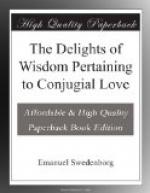upon the things which belong to the thought grounded
in the understanding, and not upon those which belong
to the love grounded in the will; for the latter do
not appear in light as the former. Nevertheless,
he that does not distinguish between the will and
the understanding, cannot distinguish between evils
and goods, and consequently he must remain in entire
ignorance concerning the blame of sin. But who
does not know that good and truth are two distinct
principles, like love and wisdom? and who cannot hence
conclude, while he is in rational illumination, that
there are two faculties in man, which distinctly receive
and appropriate to themselves those principles, and
that the one is the will and the other the understanding,
by reason that what the will receives and reproduces
is called good, and what the understanding receives
is called truth; for what the will loves and does,
is called truth, and what the understanding perceives
and thinks, is called truth? Now as the marriage
of good and truth was treated of in the first part
of this work, and in the same place several considerations
were adduced concerning the will and the understanding,
and the various attributes and predicates of each,
which, as I imagine, are also perceived by those who
had not thought at all distinctly concerning the understanding
and the will, (for human reason is such, that it understands
truths from the light thereof, although it has not
heretofore distinguished them); therefore, in order
that the distinctions of the understanding and the
will may be more clearly perceived, I will here mention
some particulars on the subject, that it may be known
what is the quality of adulteries of the reason and
the understanding, and afterwards what is the quality
of adulteries of the will. The following points
may serve to illustrate the subject: 1.
That the will of itself does nothing; but whatever
it does, it does by the understanding. 2. On
the other hand also, that the understanding alone
of itself does nothing; but whatever it does, it does
from the will. 3. That the will flows into the
understanding but not the understanding into the will;
yet that the understanding teaches what is good and
evil, and consults with the will, that out of those
two principles it may choose and do what is pleasing
to it. 4. That after this there is effected a
twofold conjunction; one, in which the will acts from
within, and the understanding from without; the other
in which the understanding acts from within, and the
will from without: thus are distinguished the
adulteries of the reason, which are here treated of,
from the adulteries of the will, which are next to
be treated of. They are distinguished, because
one is more grievous than the other; for the adultery
of the reason is less grievous than that of the will;
because in adultery of the reason, the understanding
acts from within, and the will from without; whereas
in adultery of the will, the will acts from within,
and the understanding from without; and the will is
the man himself, and the understanding is the man
as grounded in the will; and that which acts within
has dominion over that which acts without.




